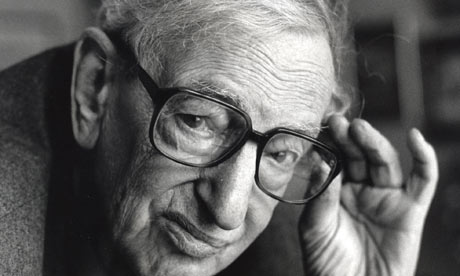 Eric Hobsbawm is the subject of much criticism in the light of his attempt to see his MI5 files. Michael Burleigh, Stephen Glover and Geoffrey Levy have offered caustic appraisals of 'Britain's Greatest Living Historian' in the Mail. Seumas Milne in the Guardian offers a robust defence of Hobsbawm's lifelong support for Soviet Communism.
Eric Hobsbawm is the subject of much criticism in the light of his attempt to see his MI5 files. Michael Burleigh, Stephen Glover and Geoffrey Levy have offered caustic appraisals of 'Britain's Greatest Living Historian' in the Mail. Seumas Milne in the Guardian offers a robust defence of Hobsbawm's lifelong support for Soviet Communism. Unlike EP Thompson and many other British Marxists, Hobsbawm did not resign his membership of the Communist Party after the crushing of the Hungarian Uprising of 1956, nor did he do so after Soviet tanks rolled into the Czechoslovak capital to end the Prague Spring.
After all, as he points out, without a trace of irony, in his collection of essays On History (1997): ‘Fragile as the communist systems turned out to be, only a limited, even minimal, use of force was necessary to maintain them from 1957 until 1989’.
‘Fragile as the communist systems turned out to be, only a limited, even minimal, use of force was necessary to maintain them from 1957 until 1989’.
Hobsbawm stayed with the party until it simply withered away. Curiously, he went on to accept the offer of a Companion of Honour made by Tony Blair. The honour has been awarded to just 45 living individuals, whose motto is In Action Faithful and in Honour Clear. It does seem an anomaly. But I think Hobsbawm's ambiguities can be explained.
He is, like many intellectuals of the European tradition - and anyone who has read his autobiography will appreciate that he identifies totally with the European tradition, displaying an evident loathing towards the USA and a studied indifference to Britain - immersed in abstraction. Hobsbawm has lived the privileged life of a gifted intellectual for whom real life barely exists at all, hence his strange indifference to the suffering of people under the Soviet regimes.
That Hobsbawm is a brilliant historian is evident to anyone who had read his great trilogy on the long 19th century (a judgement echoed by such disparate figures as Niall Ferguson and Tristram Hunt). But he doesn't do people. He is unashamedly a ‘Tory Communist’, above and beyond the concerns of ordinary folk. As such, that he can be an unrepentant marxist and accept a companion of honour should come as no surprise at all.

2 comments:
Excellent post about Hobsbawm, though it's worth noting that not all intellectuals of the European tradition are so disconnected from reality. George Steiner - who's about as steeped in the European tradition as you can get - has deplored the anti-intellectualism of British society. Yet Steiner is worldly enough to acknowledge that British scepticism about the transformative power of ideas may in fact be the country's saving grace. Hitler, he has suggested, would have struggled to win over the crowd at Hyde Park corner, while Enoch Powell's glittering academic acheivements, far from lending credibility to his later anti-immigration arguments, led the British public to distrust him for being "too clever by half".
And yes, browsing pedants, I know I misspelled achievements in the above post.
Post a Comment